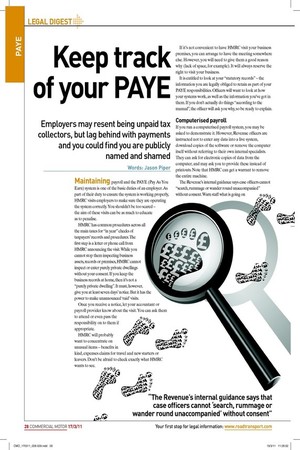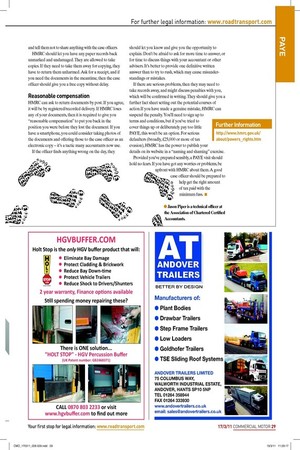Keep track of your PAYE
Page 20

Page 21

If you've noticed an error in this article please click here to report it so we can fix it.
Employers may resent being unpaid tax collectors, but lag behind with payments and you could find you are publicly named and shamed
Words: Jason Piper Maintaining payroll and the PAYE (Pay As You Earn) system is one of the basic duties of an employer. As part of their duty to ensure the system is working properly, HMRC visits employers to make sure they are operating the system correctly. You shouldn’t be too scared – the aim of these visits can be as much to educate as to penalise.
HMRC has common procedures across all the main taxes for “in year” checks of taxpayers’ records and procedures. The first step is a letter or phone call from HMRC announcing the visit. While you cannot stop them inspecting business assets, records or premises, HMRC cannot inspect or enter purely private dwellings without your consent. If you keep the business records at home, then it’s not a “purely private dwelling”. It must, however, give you at least seven days’ notice. But it has the power to make unannounced ‘raid’ visits.
Once you receive a notice, let your accountant or payroll provider know about the visit. You can ask them to attend or even pass the responsibility on to them if appropriate.
HMRC will probably want to concentrate on unusual items – benefits in kind, expenses claims for travel and new starters or leavers. Don’t be afraid to check exactly what HMRC wants to see. If it’s not convenient to have HMRC visit your business premises, you can arrange to have the meeting somewhere else. However, you will need to give them a good reason why (lack of space, for example). It will always reserve the right to visit your business.
It is entitled to look at your “statutory records” – the information you are legally obliged to retain as part of your PAYE responsibilities. Officers will want to look at how your systems work, as well as the information you’ve got in them. If you don’t actually do things “according to the manual”, the officer will ask you why, so be ready to explain.
Computerised payroll
If you run a computerised payroll system, you may be asked to demonstrate it. However, Revenue officers are instructed not to enter any data into a live system, download copies of the software or remove the computer itself without referring to their own internal specialists. They can ask for electronic copies of data from the computer, and may ask you to provide these instead of printouts. Note that HMRC can get a warrant to remove the entire machine.
The Revenue’s internal guidance says case officers cannot “search, rummage or wander round unaccompanied” without consent. Warn staff what is going on and tell them not to share anything with the case officers.
HMRC should let you have any paper records back unmarked and undamaged. They are allowed to take copies. If they need to take them away for copying, they have to return them unharmed. Ask for a receipt, and if you need the documents in the meantime, then the case officer should give you a free copy without delay.
Reasonable compensation
HMRC can ask to return documents by post. If you agree, it will be by registered/recorded delivery. If HMRC loses any of your documents, then it is required to give you “reasonable compensation” to put you back in the position you were before they lost the document. If you have a smartphone, you could consider taking photos of the documents and offering those to the case officer as an electronic copy – it’s a tactic many accountants now use.
If the officer finds anything wrong on the day, they should let you know and give you the opportunity to explain. Don’t be afraid to ask for more time to answer, or for time to discuss things with your accountant or other advisers. It’s better to provide one definitive written answer than to try to rush, which may cause misunderstandings or mistakes.
If there are serious problems, then they may need to take records away, and might discuss penalties with you, which will be confirmed in writing. They should give you a further fact sheet setting out the potential courses of action.If you have made a genuine mistake, HMRC can suspend the penalty. You’ll need to sign up to terms and conditions, but if you’ve tried to cover things up or deliberately pay too little PAYE, this won’t be an option. For serious defaulters (broadly, £25,000 or more of tax evasion), HMRC has the power to publish your details on its website in a “naming and shaming” exercise.
Provided you’ve prepared sensibly, a PAYE visit should hold no fears. If you have got any worries or problems, be upfront with HMRC about them. A good case officer should be prepared to help get the right amount of tax paid with the minimum fuss. ■
● Jason Piper is a technical officer at the Association of Chartered Certified Accountants.


















































